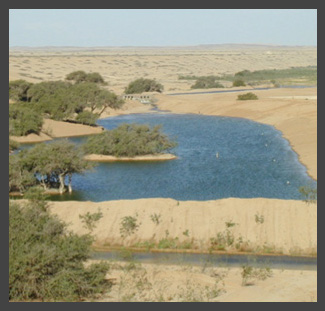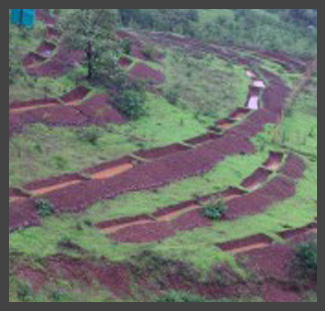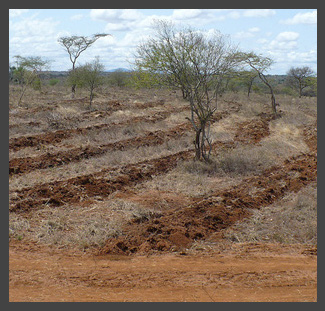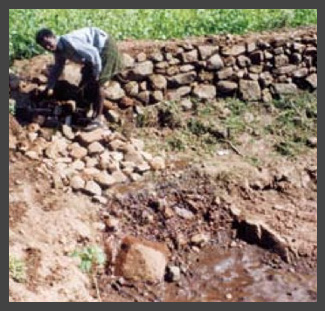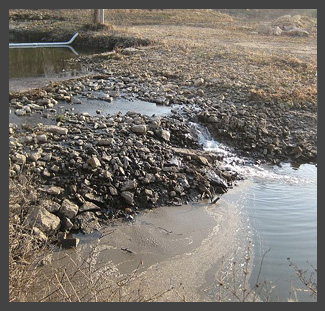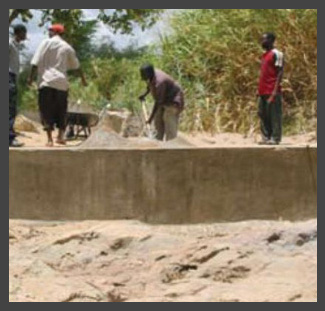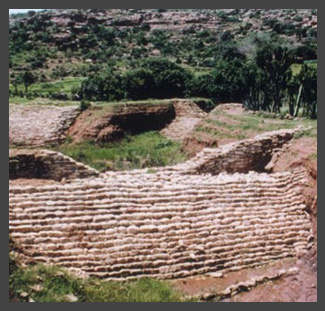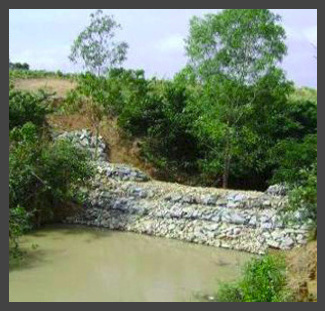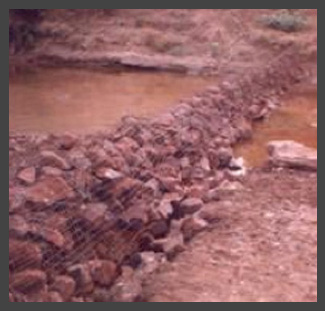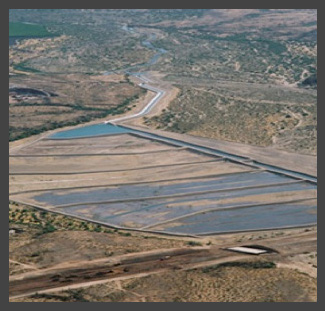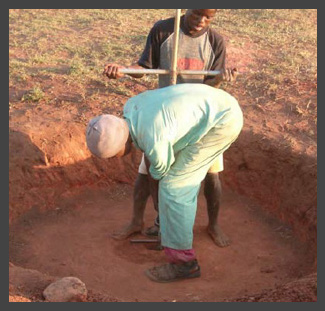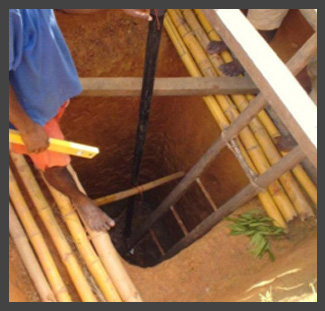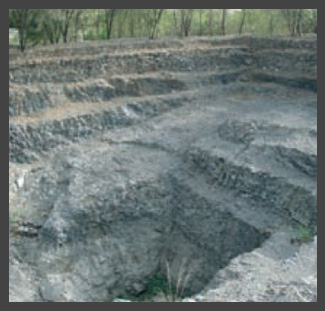Difference between revisions of "地下水回灌"
From Akvopedia
Jayjay 1408 (talk | contribs) |
(→地下水回灌链接) |
||
| (14 intermediate revisions by 2 users not shown) | |||
| Line 1: | Line 1: | ||
| − | {{Language-box|english_link=Groundwater recharge | + | {{Language-box|english_link=Water Portal / Rainwater Harvesting / Groundwater recharge |french_link=La recharge des eaux souterraines | spanish_link=Recarga de acuiferos |hindi_link=वाटर पोर्टल / वर्षाजल संचयन / भूजल पुनर्भरण |malayalam_link=Coming soon|tamil_link=Coming soon | korean_link=Coming soon | chinese_link=地下水回灌 | indonesian_link=Panen Air Hujan / Pengisian ulang air tanah | japanese_link=地下水涵養}} |
地下水回灌是指通过渗透性水池,沟渠,大坝或注水井等人造运输方式来增加天然地下水的供给。含水层存储和修复(ASR)是地下水回灌的一个类型,它不仅可以增加地下水资源,还可以修复未来的水资源供各方面使用。 | 地下水回灌是指通过渗透性水池,沟渠,大坝或注水井等人造运输方式来增加天然地下水的供给。含水层存储和修复(ASR)是地下水回灌的一个类型,它不仅可以增加地下水资源,还可以修复未来的水资源供各方面使用。 | ||
<small-title /> | <small-title /> | ||
| Line 15: | Line 15: | ||
|colspan="5" style="background-color:#efefef;"| | |colspan="5" style="background-color:#efefef;"| | ||
|- | |- | ||
| − | |style="background:#efefef;"|[[Image:infiltration ponds small.jpg|center|100px|link= | + | |style="background:#efefef;"|[[Image:infiltration ponds small.jpg|center|100px|link=渗透池]] |
| − | |style="background:#efefef;"|[[Image:contour trench small.jpg|center|100px|link= | + | |style="background:#efefef;"|[[Image:contour trench small.jpg|center|100px|link=等高沟]] |
| − | |style="background:#efefef;"|[[Image:contour ridges small.jpg|center|100px|link= | + | |style="background:#efefef;"|[[Image:contour ridges small.jpg|center|100px|link=等高地垄]] |
| − | |style="background:#efefef;"|[[Image:bunds small.jpg|center|100px|link= | + | |style="background:#efefef;"|[[Image:bunds small.jpg|center|100px|link=蓄水围]] |
| − | |style="background:#efefef;"|[[Image:permeable rock dam small.jpg|center|100px|link= | + | |style="background:#efefef;"|[[Image:permeable rock dam small.jpg|center|100px|link=堆石透水坝]] |
|- | |- | ||
| − | |style="background:#efefef;"|<div class="center" style="width:auto; margin-left:auto; margin-right:auto;">[[ | + | |style="background:#efefef;"|<div class="center" style="width:auto; margin-left:auto; margin-right:auto;">[[渗透池 | 渗透池塘]]</div> |
| − | |style="background:#efefef;"|<div class="center" style="width:auto; margin-left:auto; margin-right:auto;">[[ | + | |style="background:#efefef;"|<div class="center" style="width:auto; margin-left:auto; margin-right:auto;">[[等高沟 | 等高沟渠]]</div> |
| − | |style="background:#efefef;"|<div class="center" style="width:auto; margin-left:auto; margin-right:auto;">[[ | + | |style="background:#efefef;"|<div class="center" style="width:auto; margin-left:auto; margin-right:auto;">[[等高地垄 | 等高田埂]]</div> |
| − | |style="background:#efefef;"|<div class="center" style="width:auto; margin-left:auto; margin-right:auto;">[[ | + | |style="background:#efefef;"|<div class="center" style="width:auto; margin-left:auto; margin-right:auto;">[[蓄水围 | 堤岸]]</div> |
| − | |style="background:#efefef;"|<div class="center" style="width:auto; margin-left:auto; margin-right:auto;">[[ | + | |style="background:#efefef;"|<div class="center" style="width:auto; margin-left:auto; margin-right:auto;">[[堆石透水坝 | 渗透性石坝]]</div> |
|- | |- | ||
|colspan="5" style="background-color:#efefef;"| | |colspan="5" style="background-color:#efefef;"| | ||
| Line 33: | Line 33: | ||
|colspan="5" style="background-color:#efefef;"| | |colspan="5" style="background-color:#efefef;"| | ||
|- | |- | ||
| − | |style="background:#efefef;"|[[Image:sand dam small.jpg|center|100px|link=Sand dam]] | + | |style="background:#efefef;"|[[Image:sand dam small.jpg|center|100px|link=Water Portal / Rainwater Harvesting / Groundwater recharge / Sand dam]] |
| − | |style="background:#efefef;"|[[Image:check dam small.jpg|center|100px|link=Check dams (gully plugs)]] | + | |style="background:#efefef;"|[[Image:check dam small.jpg|center|100px|link=Water Portal / Rainwater Harvesting / Groundwater recharge / Check dams (gully plugs)]] |
| − | |style="background:#efefef;"|[[Image:leaky dam small.jpg|center|100px|link=Leaky dams]] | + | |style="background:#efefef;"|[[Image:leaky dam small.jpg|center|100px|link=Water Portal / Rainwater Harvesting / Groundwater recharge / Leaky dams]] |
| − | |style="background:#efefef;"|[[Image:gabion small.jpg|center|100px|link=Gabions]] | + | |style="background:#efefef;"|[[Image:gabion small.jpg|center|100px|link=Water Portal / Rainwater Harvesting / Groundwater recharge / Gabions]] |
| − | |style="background:#efefef;"|[[Image:controlled flooding small.jpg|center|100px|link=Controlled flooding | + | |style="background:#efefef;"|[[Image:controlled flooding small.jpg|center|100px|link=Water Portal / Rainwater Harvesting / Groundwater recharge / Controlled flooding and Spreading basins]] |
|- | |- | ||
| − | |style="background:#efefef;"|<div class="center" style="width:auto; margin-left:auto; margin-right:auto;">[[Sand dam]]</div> | + | |style="background:#efefef;"|<div class="center" style="width:auto; margin-left:auto; margin-right:auto;">[[Water Portal / Rainwater Harvesting / Groundwater recharge / Sand dam|沙坝]]</div> |
| − | |style="background:#efefef;"|<div class="center" style="width:auto; margin-left:auto; margin-right:auto;">[[Check dams (gully plugs)]]</div> | + | |style="background:#efefef;"|<div class="center" style="width:auto; margin-left:auto; margin-right:auto;">[[Water Portal / Rainwater Harvesting / Groundwater recharge / Check dams (gully plugs)|淤地坝]]</div> |
| − | |style="background:#efefef;"|<div class="center" style="width:auto; margin-left:auto; margin-right:auto;">[[Leaky dams]]</div> | + | |style="background:#efefef;"|<div class="center" style="width:auto; margin-left:auto; margin-right:auto;">[[Water Portal / Rainwater Harvesting / Groundwater recharge / Leaky dams|渗漏型坝]]</div> |
| − | |style="background:#efefef;"|<div class="center" style="width:auto; margin-left:auto; margin-right:auto;">[[Gabions]]</div> | + | |style="background:#efefef;"|<div class="center" style="width:auto; margin-left:auto; margin-right:auto;">[[Water Portal / Rainwater Harvesting / Groundwater recharge / Gabions|石笼]]</div> |
| − | |style="background:#efefef;"|<div class="center" style="width:auto; margin-left:auto; margin-right:auto;">[[ | + | |style="background:#efefef;"|<div class="center" style="width:auto; margin-left:auto; margin-right:auto;">[[Water Portal / Rainwater Harvesting / Groundwater recharge / Controlled_flooding and Spreading_basins|受控洪泛盆地]]</div> |
|- | |- | ||
|colspan="5" style="background-color:#efefef;"| | |colspan="5" style="background-color:#efefef;"| | ||
| Line 51: | Line 51: | ||
|colspan="5" style="background-color:#efefef;"| | |colspan="5" style="background-color:#efefef;"| | ||
|- | |- | ||
| − | |style="background:#efefef;"|[[Image:tube recharge small.jpg|center|100px|link=Tube recharge]] | + | |style="background:#efefef;"|[[Image:tube recharge small.jpg|center|100px|link=Water Portal / Rainwater Harvesting / Groundwater recharge / Tube recharge]] |
| − | |style="background:#efefef;"|[[Image:Infiltration_well small.JPG|center|100px|link=Infiltration wells]] | + | |style="background:#efefef;"|[[Image:Infiltration_well small.JPG|center|100px|link=Water Portal / Rainwater Harvesting / Groundwater recharge / Infiltration wells]] |
| − | |style="background:#efefef;"|[[Image:wells, shafts, boreholes small.jpg|center|100px|link=Wells, shafts, and boreholes]] | + | |style="background:#efefef;"|[[Image:wells, shafts, boreholes small.jpg|center|100px|link=Water Portal / Rainwater Harvesting / Groundwater recharge / Wells, shafts, and boreholes]] |
|style="background:#efefef;"| | |style="background:#efefef;"| | ||
|style="background:#efefef;"| | |style="background:#efefef;"| | ||
|- | |- | ||
| − | |style="background:#efefef;"|<div class="center" style="width:auto; margin-left:auto; margin-right:auto;">[[Tube recharge]]</div> | + | |style="background:#efefef;"|<div class="center" style="width:auto; margin-left:auto; margin-right:auto;">[[Water Portal / Rainwater Harvesting / Groundwater recharge / Tube recharge|补给管]]</div> |
| − | |style="background:#efefef;"|<div class="center" style="width:auto; margin-left:auto; margin-right:auto;">[[Infiltration wells]]</div> | + | |style="background:#efefef;"|<div class="center" style="width:auto; margin-left:auto; margin-right:auto;">[[Water Portal / Rainwater Harvesting / Groundwater recharge / Infiltration wells|渗透井]]</div> |
| − | |style="background:#efefef;"|<div class="center" style="width:auto; margin-left:auto; margin-right:auto;">[[Wells,_shafts,_and_boreholes| | + | |style="background:#efefef;"|<div class="center" style="width:auto; margin-left:auto; margin-right:auto;">[[Water Portal / Rainwater Harvesting / Groundwater recharge / Wells,_shafts,_and_boreholes|水井、竖井和钻井]]</div> |
|style="background:#efefef;"| | |style="background:#efefef;"| | ||
|style="background:#efefef;"| | |style="background:#efefef;"| | ||
| Line 87: | Line 87: | ||
* [http://www.nwp.nl/_docs/Smart-solutions-3R.spread.pdf 3R 智能方法] | * [http://www.nwp.nl/_docs/Smart-solutions-3R.spread.pdf 3R 智能方法] | ||
* <font size="3">[http://www.bgs.ac.uk/africagroundwateratlas/index.cfm 非洲地下水文学档案]</font>:该档案是一个可搜索数据库,包含已发表和未发表的关于非洲地下水的各类文献,其中有报告,期刊文章, 会议论文和地图。该数据库的很多文档都可免费下载;不可下载的文档则会提供在线摘要的链接,无在线资源的文档则会提供完整的书目参考文献。 | * <font size="3">[http://www.bgs.ac.uk/africagroundwateratlas/index.cfm 非洲地下水文学档案]</font>:该档案是一个可搜索数据库,包含已发表和未发表的关于非洲地下水的各类文献,其中有报告,期刊文章, 会议论文和地图。该数据库的很多文档都可免费下载;不可下载的文档则会提供在线摘要的链接,无在线资源的文档则会提供完整的书目参考文献。 | ||
| − | * [http://www.iaea.org/technicalcooperation/documents/Brochures/sust-groundwater.pdf 非洲南部和东部地下水资源的可持续发展。] 国际原子能机构。 | + | * [http://web.archive.org/web/20151106164515/https://www.iaea.org/technicalcooperation/documents/Brochures/sust-groundwater.pdf 非洲南部和东部地下水资源的可持续发展。] 国际原子能机构。 |
* [http://www.hpscste.gov.in/rwh/Blue_Drop_Series_02_-_Capacity_Building.pdf 雨水收集和利用。] 或 ([http://www.washdoc.info/docsearch/title/154206 链接任选其一])。蓝水滴系列:第二册:受益者与能力建设者。联合国人居署。 | * [http://www.hpscste.gov.in/rwh/Blue_Drop_Series_02_-_Capacity_Building.pdf 雨水收集和利用。] 或 ([http://www.washdoc.info/docsearch/title/154206 链接任选其一])。蓝水滴系列:第二册:受益者与能力建设者。联合国人居署。 | ||
* [[Managed Aquifer Recharge (MAR)|含水层补给管理(MAR)]] | * [[Managed Aquifer Recharge (MAR)|含水层补给管理(MAR)]] | ||
| − | * 大量关于农业用水的百科知识:[http://agropedia.iitk.ac.in/ Agropedia] | + | * 大量关于农业用水的百科知识:[http://web.archive.org/web/20151025174729/http://agropedia.iitk.ac.in:80/ Agropedia] |
<br> | <br> | ||
| Line 97: | Line 97: | ||
* Tuinhof, Albert and Heederik, Jan Piet. [http://docs.watsan.net/Downloaded_Files/PDF/Tuinhof-2002-Management.pdf Management of Aquifer Recharge and Subsurface Storage] or ([http://siteresources.worldbank.org/INTWRD/Resources/GWMATE_Final_booklet.pdf alternative link]). Netherlands National Committee for the IAH and Netherlands Hydrological Society. 2002. | * Tuinhof, Albert and Heederik, Jan Piet. [http://docs.watsan.net/Downloaded_Files/PDF/Tuinhof-2002-Management.pdf Management of Aquifer Recharge and Subsurface Storage] or ([http://siteresources.worldbank.org/INTWRD/Resources/GWMATE_Final_booklet.pdf alternative link]). Netherlands National Committee for the IAH and Netherlands Hydrological Society. 2002. | ||
* [http://water.epa.gov/type/groundwater/uic/aquiferrecharge.cfm Aquifer Recharge (AR) and Aquifer Storage & Recovery (ASR)]. United States EPA. | * [http://water.epa.gov/type/groundwater/uic/aquiferrecharge.cfm Aquifer Recharge (AR) and Aquifer Storage & Recovery (ASR)]. United States EPA. | ||
| − | * [ | + | * [https://ccafs.cgiar.org/publications/management-groundwater-africa-including-transboundary-aquifers-implications-food#.VW9-t61VhBc Management of Ground Water in Africa Including Transboundary Aquifers: Implications for Food Security, Livelihood and Climate Change Adaptation.] United Nations Economic Commission for Africa, African Climate Policy Centre, 2011. |
* CARE Nederland, Desk Study: [[Resilient WASH systems in drought-prone areas]]. October 2010. | * CARE Nederland, Desk Study: [[Resilient WASH systems in drought-prone areas]]. October 2010. | ||
Latest revision as of 01:19, 2 December 2016
| |
|
|
|
|
|
|
|
|
地下水回灌是指通过渗透性水池,沟渠,大坝或注水井等人造运输方式来增加天然地下水的供给。含水层存储和修复(ASR)是地下水回灌的一个类型,它不仅可以增加地下水资源,还可以修复未来的水资源供各方面使用。
考虑因素:气候变化
- 需要更多储存容量来克服季节性干旱期以及减少洪涝。
- 降雨强度过高会超出土地的渗透能力。这时可以增加存储,增强渗透力或采取人工回灌。
- 降雨量过低则会导致需要运输和储蓄其他地方的水。
- 植被的变化会引起蒸散,地表径流,侵蚀和泥沙输移或沉降等变化。这就需要良好的水土保护措施,例如修建梯田。
实践经验
以下工程应用了地下水回灌技术,属于在Akvo.org极简报告(RSR) 中列出的项目。
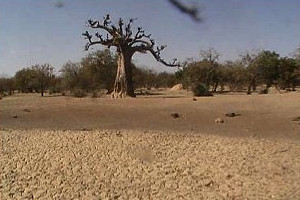 工程前期研究 |
 社区WASH工程及安全孕产工程 |
地下水回灌链接
- 3R 智能方法
- 非洲地下水文学档案:该档案是一个可搜索数据库,包含已发表和未发表的关于非洲地下水的各类文献,其中有报告,期刊文章, 会议论文和地图。该数据库的很多文档都可免费下载;不可下载的文档则会提供在线摘要的链接,无在线资源的文档则会提供完整的书目参考文献。
- 非洲南部和东部地下水资源的可持续发展。 国际原子能机构。
- 雨水收集和利用。 或 (链接任选其一)。蓝水滴系列:第二册:受益者与能力建设者。联合国人居署。
- 含水层补给管理(MAR)
- 大量关于农业用水的百科知识:Agropedia
鸣谢
- Tuinhof, Albert and Heederik, Jan Piet. Management of Aquifer Recharge and Subsurface Storage or (alternative link). Netherlands National Committee for the IAH and Netherlands Hydrological Society. 2002.
- Aquifer Recharge (AR) and Aquifer Storage & Recovery (ASR). United States EPA.
- Management of Ground Water in Africa Including Transboundary Aquifers: Implications for Food Security, Livelihood and Climate Change Adaptation. United Nations Economic Commission for Africa, African Climate Policy Centre, 2011.
- CARE Nederland, Desk Study: Resilient WASH systems in drought-prone areas. October 2010.
